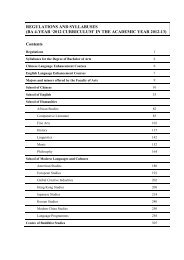Bachelor of Arts (BA) - The University of Hong Kong
Bachelor of Arts (BA) - The University of Hong Kong
Bachelor of Arts (BA) - The University of Hong Kong
Create successful ePaper yourself
Turn your PDF publications into a flip-book with our unique Google optimized e-Paper software.
202HIST2031.History through film (6 credits)(This course is also <strong>of</strong>fered to non-<strong>BA</strong> students for inter-Faculty broadening purposes.)This course looks at the manner in which film has portrayed events in history, considering the degree towhich film can enhance or be detrimental to our understanding <strong>of</strong> history.Students may expect to gain some appreciation, not just <strong>of</strong> the films themselves, but <strong>of</strong> the degree towhich any movie is the product <strong>of</strong> a certain historical period and reflect its values and preoccupations.This course should be particularly enlightening to students who taking other United States historycourses and American Studies majors.Students are expected to produce one term paper, a comparative study <strong>of</strong> at least two films, toparticipate in class discussions, and to make at least one presentation in class.Assessment: 100% coursework.HIST2034.An Introduction to the history <strong>of</strong> education in <strong>Hong</strong> <strong>Kong</strong> (6 credits)(This course is also <strong>of</strong>fered to second and third year non-<strong>BA</strong> students for inter-Faculty broadeningpurposes.)<strong>The</strong> course will provide students with the opportunity to relate educational developments in <strong>Hong</strong> <strong>Kong</strong>to contemporary opinion and other socio-economic pressures. It has been designed to introducestudents to the perspectives, methods, and resources <strong>of</strong> history as they can be applied to educationalmatters and not merely to present a set <strong>of</strong> non-dispute-worthy "facts" about past <strong>Hong</strong> <strong>Kong</strong> schools.As such, it is essentially a form <strong>of</strong> social history.Assessment: 100% coursework.HIST2035.<strong>The</strong> Bauhinia and the Lotus: Culture and history <strong>of</strong> the two SARS (6 credits)(This course is also <strong>of</strong>fered to second and third year non-<strong>BA</strong> students for inter-Faculty broadeningpurposes.)Prior to the Opium War, Macao was the major theatre for the first encounter between China and theWest. After <strong>Hong</strong> <strong>Kong</strong> had been ceded to Great Britain by <strong>The</strong> Nanjing Treaty, <strong>Hong</strong> <strong>Kong</strong> soonreplaced Macao as the centre for Sino-Western cultural and technical interchange.Even though before 1997 and 1999 both <strong>Hong</strong> <strong>Kong</strong> and Macao were under the administration <strong>of</strong>Western countries, both have remained a predominantly Chinese society with their own unique heritageand history.<strong>The</strong> aim <strong>of</strong> this course is to introduce to the student the development <strong>of</strong> <strong>Hong</strong> <strong>Kong</strong> and Macao's historyand cultural heritage. It emphasizes the role and function <strong>of</strong> <strong>Hong</strong> <strong>Kong</strong> and Macao history in modernand contemporary Chinese history and its cultural interactions with the West.Assessment: 100% coursework.HIST2037. Germany between the two World Wars: <strong>The</strong> rise and fall <strong>of</strong> Adolf Hitler (6credits)(This course is also <strong>of</strong>fered to second and third year non-<strong>BA</strong> students for inter-Faculty broadeningpurposes.)<strong>The</strong> inter-war years between 1918 and 1945 were a time <strong>of</strong> traumatic upheaval in the history <strong>of</strong> modernGermany. After World War I freedom and democracy in the Weimar Republic were threatened bynationalism, fascism, socialism and communism. <strong>The</strong>se pressures were intensified by economictensions and high unemployment rates. <strong>The</strong> miserable conditions contributed to the rise <strong>of</strong> the Nazisand Adolf Hitler, an extreme nationalist who wanted a reawakened, racially united Germany to expandeastward at the expense <strong>of</strong> the Slavs. After finally seizing power in 1933, Hitler installed a totalitarian
















